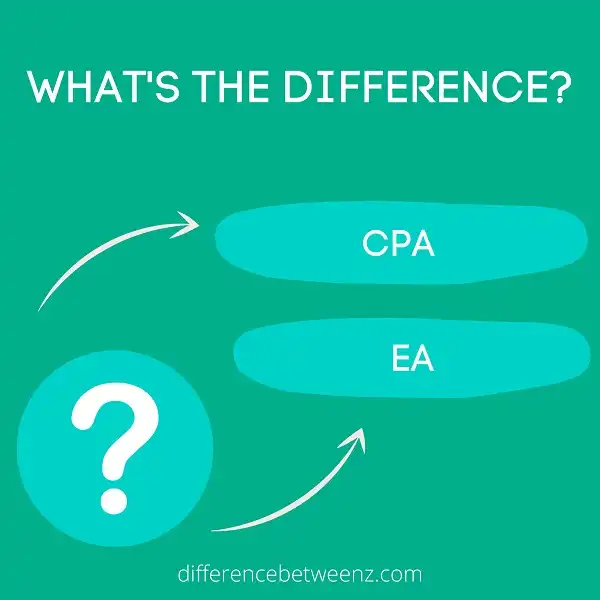Certified Public Accountants (CPA) and Enrolled Agents (EA) are both licensed professionals who provide tax services. However, there are some key differences between these two licenses. CPAs are qualified to prepare and audit financial statements, while EAs are only authorized to represent taxpayers before the IRS. CPAss also have more education requirements than EAs. If you need someone to help you with your taxes, it is important to understand the difference between these two licenses so that you can choose the right professional for your needs.
What is CPA?
CPA stands for Certified Public Accountant. A CPA is a professional who has been licensed by the state to provide accounting services to the public. CPA licensure is granted by the state Board of Accountancy after the CPA has met certain educational and experience requirements, and has passed a Uniform CPA Examination. CPAs are required to adhere to a strict code of professional conduct and are subject to periodic licensure renewal. CPA services include auditing, tax preparation, and financial planning. CPAs may also provide management consulting services, such as estates and trusts planning, insolvency consulting, and forensic accounting. The CPA designation is recognized worldwide as a symbol of excellence in the profession of accounting.
What is EA?
EA stands for Enrolled Agent. EA’s are federally licensed tax practitioners who have demonstrated technical competence in the field of taxation. EA’s are authorized to represent taxpayers before the Internal Revenue Service. EA’s are impartial and work for the best interest of their clients. EA’s keep up to date with tax law changes and IRS procedures. EA’s help taxpayers with a wide range of services including tax return preparation, planning, representational matters, and more. EA’s also have the option to specialize in a particular area of taxation such as international taxation or small business taxation. EA’s must adhere to a code of ethics and complete continuing education requirements on an annual basis.
Difference between CPA and EA
- CPAs are licensed by individual state boards of accountancy. In order to qualify for licensure, candidates must complete a four-year college degree, pass the CPA Exam, and meet other state-specific requirements. EAs are licensed by the IRS. In order to qualify for licensure, candidates must pass a three-part examination administered by the IRS. Both CPAs and EAs are required to complete continuing education in order to maintain their license.
- CPAs are allowed to provide a wide range of accounting services, including tax preparation, auditing, and financial planning. EAs are limited to providing tax preparation and representation services. However, EAs may have an advantage when it comes to representing taxpayers before the IRS, as they are familiar with the IRS’s administrative procedures.
- CPAs are often employed by public accounting firms, while EAs are more likely to be self-employed or work for smaller accounting firms. Whether you choose to work with a CPA or an EA will depend on your individual needs and preferences.
Conclusion
Certified public accountants (CPA) and enrolled agents (EA) are both tax professionals, but there are some key differences between the two. CPAs have passed a national exam and meet certain education requirements, while EAs are licensed by the IRS. If you need help filing your taxes or want someone to represent you before the IRS, it’s important to know the difference between these two types of tax professionals.


